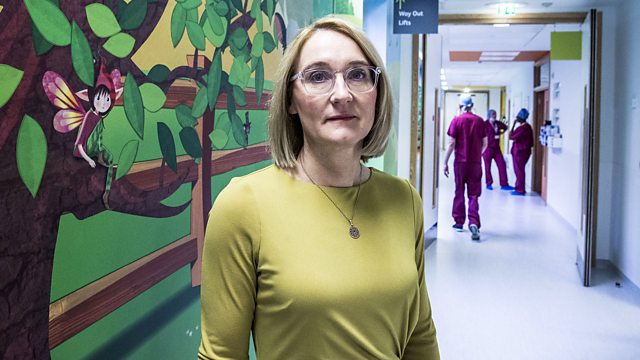
As medical advances cure patients with cancer, who a decade ago may not have survived, doctors face the challenge of using newer therapies which are not without risk.
In the UK, over the last 40 years, the number of people surviving cancer in the UK has doubled. However, one in two of us will get cancer in our lifetime. Radical new treatments and surgeries are offering patients hopes of survival where previously there were none.
Two-year-old Yeshua has an aggressive cancerous tumour in his abdomen. In Iraq, where he was born, Yeshua was given a 5 per cent chance of survival. Though high doses of chemotherapy have shrunk the tumour over the last six months, in order for Yeshua to survive, he needs an extremely complicated 12-hour operation at Alder Hey Children鈥檚 Hospital to remove as much of the growth as possible.
If the surgical team can successfully operate, Yeshua will be able to receive immunotherapy at the Clatterbridge Cancer Centre on the Wirral, which has been at the forefront of cancer treatment for over 150 years. Immunotherapy is a cutting-edge treatment that works by helping the body鈥檚 immune system to recognise cancer and then attack it in the same way as an infection. Yeshua鈥檚 form of immunotherapy will cost around 拢150,000 for a full course.
For some, immunotherapy is hailed as the biggest breakthrough since conventional chemotherapy, but there is concern that the new treatment can carry significant and differing risks. Whilst curing cancer, it can damage other organs in the body.
Currently, it is only applied to treat eight different types of cancer. One of these is head-and-neck cancer. Sixty-five-year-old Paul was diagnosed 18 months ago. Chemotherapy and radiotherapy have not stopped the cancer spreading, but oncologist Anna Olsson-Brown referred him for immunotherapy, and his condition has significantly improved over three months.
Recently, however, Paul has developed problems with his heart because of the immunotherapy. Anna must meet with cardiologist Rebecca Dobson at Liverpool Heart and Chest Hospital (LHCH) to work out whether they can progress the immunotherapy treating Paul鈥檚 cancer without putting him in danger.
Rebecca Dobson heads up Liverpool Heart and Chest鈥檚 brand new cardio oncology service, which looks after patients like Paul who have developed heart problems during cancer treatment. Like many specialists across Liverpool, she is reliant on radiologists who perform vital scans. But, throughout the NHS, nearly 10 per cent of radiology staff positions are vacant. A national staff shortage has reached crisis levels, leading to the health service spending some 拢165 million on contracting radiology work to private companies in 2018. If they are to keep pace with the dramatic rate of change in treatments for cancer and other conditions, radiologists from across the city must make an urgent plan of action.
At the forefront of innovations in medical science, doctors are now able to offer patients hopes for the future that go well beyond their recovery. Oncologist Lisa Howell is responsible for many paediatric cancer patients who stand a good chance of living well into adulthood. She has been treating nine-year-old Edward for six years so far. Edward has a slow-growing, inoperable non-malignant brain tumour called a glioma.
As Lisa prepares Edward to start another round of chemotherapy, the treatment throws up a complex ethical question - it stands a very high chance of making him infertile. Now, Alder Hey Children鈥檚 Hospital have teamed up with a preservation laboratory in Oxford to offer a pioneering procedure in which stem cells from Edward鈥檚 testes can be harvested and frozen. The procedure is more advanced for girls and has resulted in several babies being born worldwide, but only a few boys have ever had the procedure at Alder Hey.
Audiences witness the complexities of the dilemmas and decision-making which happen every day for consultants, surgeons and managers, and the impact these decisions have on patients.
Against the backdrop of historic demands stemming from limited resources, increasing patient numbers and social care at full stretch, the series shows the extraordinary work of some of Liverpool鈥檚 20,000 NHS hospital staff as they push the boundaries of what is possible with world-class, cutting-edge treatments and life-saving operations.
Hospital is a co-production with the Open University.
Last on
More episodes
Previous
Next
You are at the last episode
Credits
| Role | Contributor |
|---|---|
| Executive Producer | Jackie Waldock |
| Series Producer | Meghan Just-Truelove |
| Executive Producer | Eric Harwood |
| Series Producer | Kate O'Hara |
| Executive Producer | Lorraine Charker-Phillips |
| Executive Producer | Simon Dickson |
| Production Company | Label 1 |
Explore extensive resources and information on healthcare and nursing with The Open University
Visit the Open University website.
